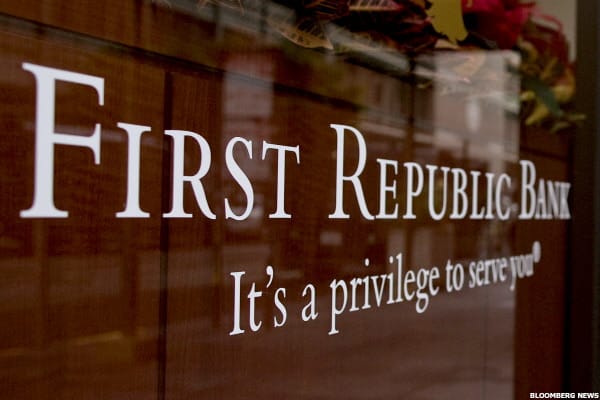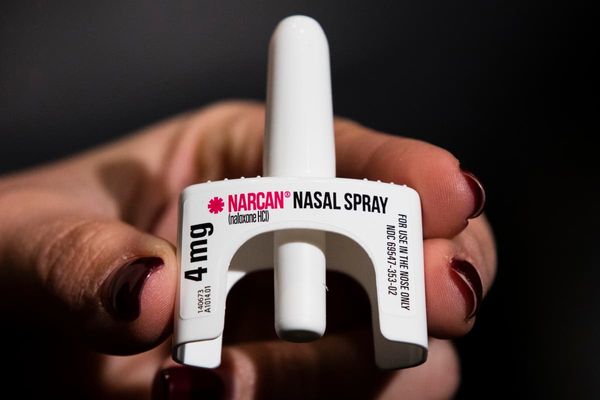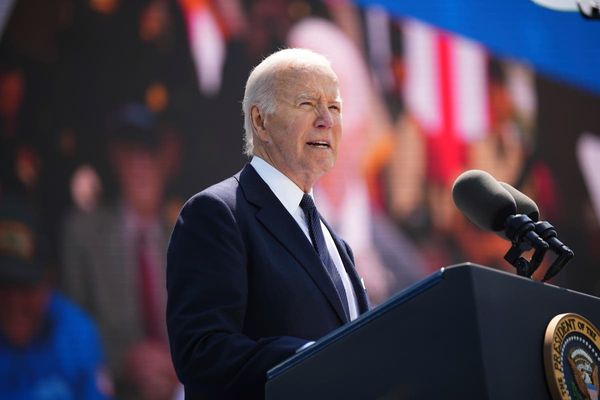
First Republic Bank (FRC) shares turned sharply higher Thursday after a collection of the biggest U.S. banks agreed to deposit as much as $30 billion in the San Francisco-based lender and wealth manager as part of a coordinated rescue plan.
The rescue plan, which was given vocal support by both the Federal Reserve and the U.S. Treasury, will see Bank of America (BACXL) , Citigroup (C), JPMorgan Chase (JPM) and Wells Fargo (WFC) each making a $5 billion uninsured deposit into First Republic Bank. Goldman Sachs Group (GS) and Morgan Stanley (MS) will deposit $2.5 billion each with BNY Mellon, PNC Bank, State Street and U.S. Bank contributing $1 billion each.
The deposit consortium has agreed to leave the cash at First Republic for at least 120 days, according to terms of the agreement, while earning the same daily interest as current First Republic clients.
"This action by America’s largest banks reflects their confidence in First Republic and in banks of all sizes, and it demonstrates their overall commitment to helping banks serve their customers and communities," the banks said in a statement. "Regional, midsize and small banks are critical to the health and functioning of our financial system."
"The actions of America’s largest banks reflect their confidence in the country’s banking system. Together, we are deploying our financial strength and liquidity into the larger system, where it is needed the most," the statement added. "Smaller- and medium-sized banks support their local customers and businesses, create millions of jobs and help uplift communities. America’s larger banks stand united with all banks to support our economy and all of those around us."
First Republic shares were marked 10.6% higher in late afternoon trading Thursday to change hands at $34.64 each, pegging the stock's five-day decline to around 50%.
CNBC first reported Thursday that the bank collective is working through plans to make a $20 billion deposit, and although no decision has been taken, the cash injection could stem the flow of deposit flight that First Republic has suffered over the past week and restore confidence in the broader regional banking sector. Bloomberg put the deposit collective at $30 billion.
Bloomberg reported late Wednesday that the bank could seek an outright sale over the coming days, but is also exploring solutions to shore-up its broader liquidity base even as the Federal Reserve continues to offer one-year term loans against high-quality collateral such as Treasury bonds, agency debt or mortgage-backed securities.
The Wall Street Journal, meanwhile, had said First Republic is in talks with Morgan Stanley JPMorgan and others as it considering either raising fresh capital or considering an outright takeover.
First Republic, which arranged $70 billion in available liquidity support from both the Federal Reserve and "additional financing" from JPMorgan earlier this week, had its credit rating cut to 'junk' status by both S&P Global Ratings and Fitch Ratings on Wednesday, citing over-concentration in its deposit base and risks to its funding profile.
JPMorgan, in fact, suggested the Fed's Fed's new “Bank Term Funding Program” (BTFP) program is likely to inject a collective $2 trillion into the U.S. banking system in order to ease liquidity stresses.
The bank, which includes high net-worth clients such as Meta Platforms (META) CEO Mark Zuckerberg, has a "strategic focus on banking wealthy and financially sophisticated customers in select urban coastal markets in the U.S.", Fitch said.
"This not only drives a high proportion of uninsured deposits as a percentage of total deposits but also results in deposits that can be less sticky in times of crisis or severe stress," the ratings company added. "Fitch believes this feature of the business model has resulted in franchise erosion following the high profile failures of SVB Financial and Signature Bank, despite the deposit base being more diversified from a sector/industry standpoint."
Bank stocks, which have remained under sustained pressure for much of the week following the collapse of Silicon Valley Bank late Friday, could find support from the 50 billion Swiss franc lifeline thrown from the Swiss National Bank to troubled lender Credit Suisse earlier this morning.
Credit Suisse, which hit a record low Wednesday after its biggest shareholder, the Saudi National Bank, said it would not provide further capital if asked, received access to a so-called covered loan facility, which is similar in structure to the Federal Reserve's new bank lending backstop, and further access to a short-term liquidity fund.
The cash support followed a statement from the Swiss National Bank last night that said Credit Suisse was in-line with the "capital and liquidity requirements imposed on systemically important banks" and thus eligible for central bank assistance.
Earlier this week, analysts at Raymond James lowered their rating on Frist Republic by two notches, to 'market perform' from 'strong buy', citing the risk of deposit flight amid the ongoing SVB-triggered turmoil.
CEO Mike Roffler and founder Jim Herbert, have insisted that its deposit base is "well-diversified" and that the bank "continues to fund loans, process transactions and fully serve the needs of clients by delivering exceptional service."
Get investment guidance from trusted portfolio managers without the management fees. Sign up for Action Alerts PLUS now.







